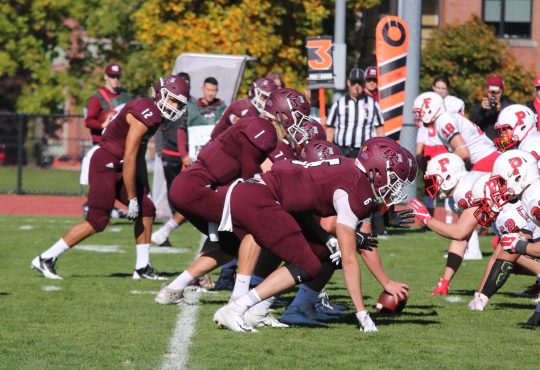The NCAA Division I football playoffs are a new feature to college football this year. The teams were selected on Dec. 7 and will play their respective semifinal games on Jan. 1 2015.
The Bowl Championship Series championship game was the previous version of championship that the NCAA used, but after multiple controversies over the selection of the two competitors in the championship, the College Football Playoff (CFP) was implemented starting at the beginning of the 2014 season.
The CFP competitors are selected by a committee of 13 experts on the sport.
According to the CFP website, the committee is made up of five current athletic directors from each of the major conferences in college football, the Atlantic Coast Conference, the Big 10, the Big 12, the Pac 12 and the Southeastern Conference.
The other eight members are all retired athletic directors, players, coaches and media members.
These 13 members are selected by a vote submitted by each of the conference commissioners in NCAA DI college football and they each serve a three-year term before a new committee is selected.
The current members are: Chairman Jeff Long, athletic director for the University of Arkansas at Fayetteville; Barry Alvarez, athletic director for the University of Wisconsin at Madison; Lieutenant General Mike Gould, former superintendent of the United States Air Force Academy; Pat Haden, athletic director for the University of Southern California; Tom Jernstedt, former NCAA Executive Vice President; Oliver Luck, athletic director for West Virginia University; Archie Manning, former University for Mississippi quarterback and All-Pro NFL quarterback; Tom Osborne, former athletic director and head coach for the University of Nebraska at Lincoln; Dan Radakovich, athletic director for Clemson University; Condoleezza Rice, Stanford University Professor and former US Secretary of State; Mike Tranghese, former conference commissioner for the Big East Conference; Steve Wieberg, former college football reporter for USA Today; Tyrone Wellingham, former head coach for Washington University.
The four teams selected on Sunday Dec. 7 were: No. 1 Alabama University, No. 2 University of Oregon, No. 3 Florida State University and No. 4 Ohio State University.
The decision was met with some complaints as only four of the “power” conferences in college football got seats in the four-spot playoff. But the committee members anticipated this and had a level-headed response to the complaints, voiced by Pac-12 commissioner Larry Scott.
“Everyone can do the math. Four slots and five big conferences, and beyond the five big conferences there are other strong teams. So any bellyaching about not getting in, I don’t think people are going to react to that. We went into it expecting it to be controversial, expecting at least one conference to be on the outside looking in,” Scott said in an interview after the selections were made.
“If you know you’re guaranteed a spot for your conference champion in the playoffs, you care less about what’s going on in other parts of the country,” Scott said.
Junior student and University of Oregon fan Jace Hanson voiced his opinions on the new system in an interview prior to the committee’s decision.
“It’s better than the old system,” Hanson said. “But I do think there are too many teams that are irrelevant [in college football].”
The semi-final match-ups work like a traditional seeded playoff system, with the highest seed playing the lowest and so on.
No. 1 Alabama will play No. 4 Ohio State in the Allstate Sugar Bowl at the Mercedes-Benz Superdome in New Orleans, Lou. on Jan. 1 at 5:30 p.m. pacific time.
No. 2 Oregon will play No. 3 Florida State in the Northwestern Mutual Rose Bowl at the Rose Bowl Stadium in Pasadena, Calif. on Jan. 1 at 2:00 p.m. Pacific time.





